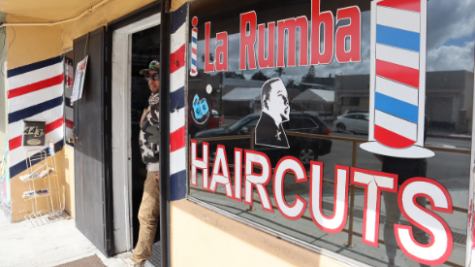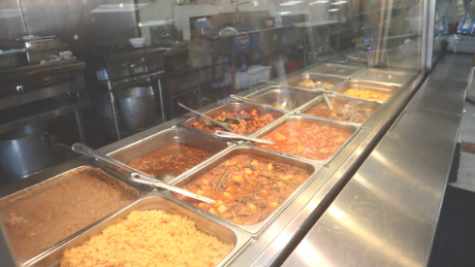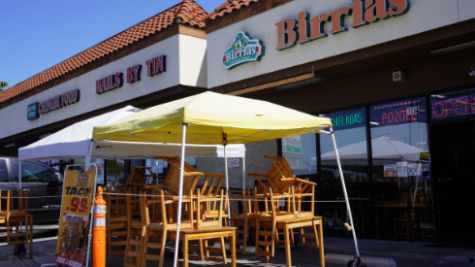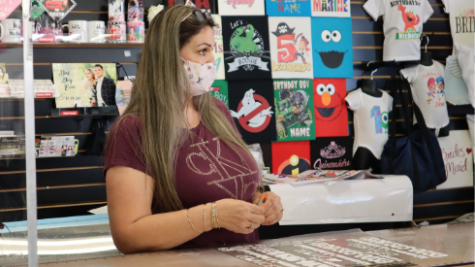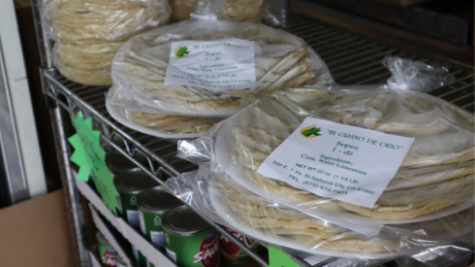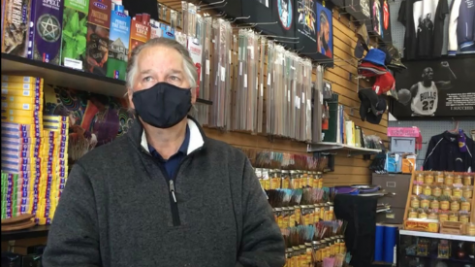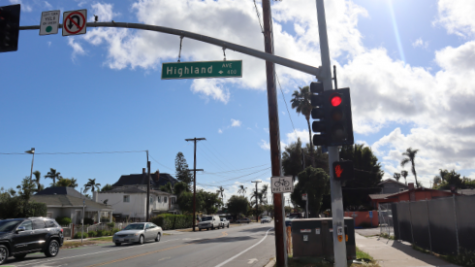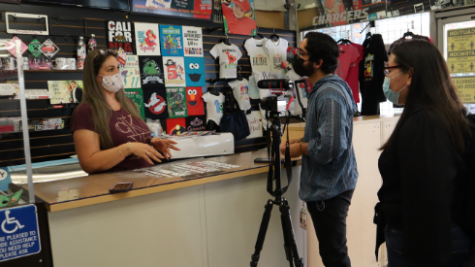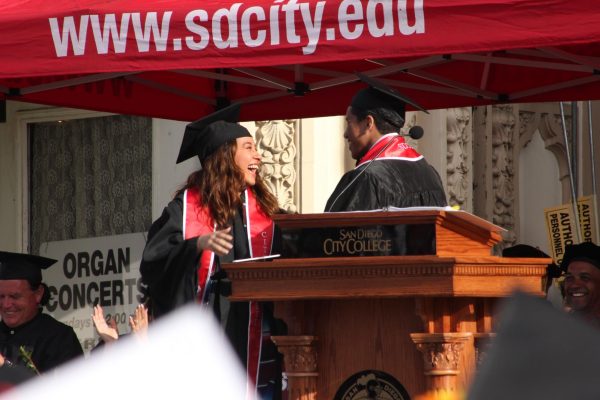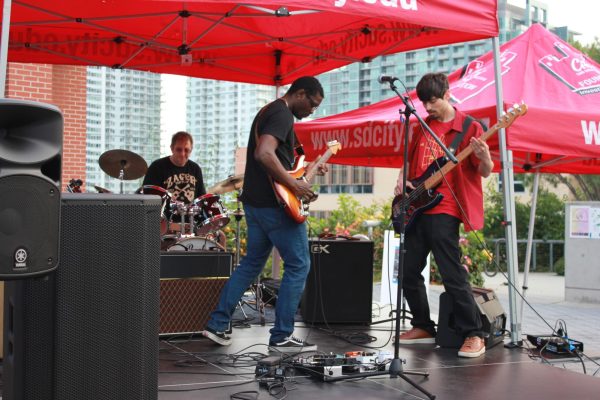National City entrepreneurs struggle to keep business afloat during COVID-19 pandemic (with podcast)
A combination of high COVID-19 cases, surging unemployment hinders Highland Avenue’s smallest businesses
More from The Highland Avenue Project
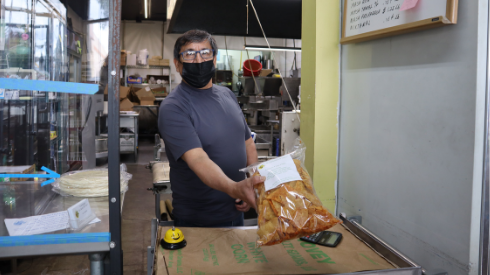
Heriberto Gerardo Gutierrez, owner of Tortilleria El Grano de Oro, hands over a bag of tortilla chips he makes at the store. Photo by Katia Pechenkina/City Times Media
To read this story in Spanish, click here.
Before the pandemic, family-owned Rodeo’s Meat Market and Catering in National City operated a local store and restaurant while serving food for large group gatherings and big businesses scattered across San Diego County.
Scrolling on its Instagram account, photos showed Rodeo’s served tacos, aguas frescas and other Mexican dishes to Costco employees, faculty at San Diego City and Southwestern colleges and even San Diego Chargers fans tailgating in the parking lot of Qualcomm Stadium.
Then came March 2020.
Stay-at-home orders by state and local officials went into effect and gatherings of all sizes were prohibited. The only option for Rodeo’s was to offer to-go orders.
“When the pandemic first hit, and with all the lockdowns happening, and our business evolves around gatherings, that’s our main thing,” said Alex Linares, the assistant manager at Rodeo’s.
“After that happened, the business started going downhill income-wise.”
One local government report said nine in 10 small businesses in the San Diego Region reported suffering a negative impact due to COVID-19 as far back as last summer.
Rodeo’s and many like it in National City were among the casualties.
The second oldest city in San Diego County has been hit disproportionately hard by a distressing combination of soaring COVID-19 infection rates and surging unemployment throughout the pandemic.
The impact of COVID-19 has caused a range of obstacles for the very smallest, family-run businesses in National City, which encompasses just over 9.2 square miles and has a population of more than 61,000 residents, according to the National City website.
“The first roll out of statistics showed that National City had the highest COVID-19 positive case rate,” said the city’s mayor, Alejandra Sotelo-Solis, in an interview with City Times Media on April 5.
No population has suffered from COVID-19 in San Diego County more than the Latinx community, with 54.5% of the county’s cases, according to data released on June 16.
In National City, 63.5% of residents identify as Hispanic or Latino, according to the most recent U.S. census.
That’s not the only issue affecting the city and its small businesses.
When comparing unemployment rates in San Diego County to cities of similar size, National City — which is the 6th largest employment center in the region, according to SANDAG — has the highest rate at 17.9%.
And even as pandemic restrictions ease, some believe more attention should be paid to what the city’s business owners really need to recover.
“We need to be thinking about how are we going to move forward and how are we going to ensure that this recovery is equitable,” said Nancy Maldonado, CEO of The Chicano Federation, a San Diego-based non-profit organization that has been serving the Latino community since 1969.
“We can’t wait till we’re in a recovery to start saying, ‘oh, wait, we need to do this equitably.’”
Small businesses typically suffer more during a recession because they have much smaller cash reserves than larger companies and usually have a more difficult time securing bank loans, according to a SANDAG report.
Highland Avenue consists mostly of small businesses.
The 1.5-mile stretch serves as National City’s downtown, starting on Division Street to the north and running all the way down south to the Sweetwater River at the city’s border with Chula Vista.
Once bustling with cruising low-riders, the street is now home to small, locally-owned restaurants, nail salons, barber shops and markets.
But those businesses were among the most affected sectors of the economy, according to local data by SANDAG following shutdowns in mid-March.
Where Highland Avenue and Plaza Boulevard meet sits a Price Breakers outlet that provides different sized spaces from where small businesses can sell their discounted items, ranging from clothing and jewelry to more eclectic objects like crystals, tarot cards and herbal remedies.
Wooden and metal dividers separate some of the shops, with high ceilings giving the building an open feeling.
Around it, the once-bustling two-story indoor bazaar only had a few customers mid-week and plenty of empty spaces where shops used to be.
“A lot of the businesses are closing up, unfortunately,” said Ana Rozo, owner of Family Decals, a marketing and advertising shop inside Price Breakers. “Some of us are still struggling to get back customers in.”
Sotelo-Solis said some of the micro-businesses like Family Decals do not have accountants or lawyers to aid in all the paperwork that some of the loans and grants require.
There has to be a paper trail and accountability from both the government and user sides to ensure money was used properly, according to Sotelo-Solis.
“What we were encouraging is that they would get handheld and walked through each of the processes with … subcontractors,” she said. “As somebody who is bilingual and … as an elected official, there are some things I have no idea how to fill out.”
In late April, more than three-quarters of the San Diego region’s small businesses applied for Paycheck Protection Program loans, SANDAG reported.
One of those was Matt Wray, owner of both Dream Crystal Gifts and Angel Petals flower shop on Highland Avenue.
With the help of his accountant, he said he was able to get a PPP loan, which helped him financially through the pandemic.
But others in the area said they were turned down. Family Decals’ Rozo and Heriberto Gerardo, who owns Tortilleria El Grano de Oro, tried to apply for PPP loans but were denied.
The two most impacted groups in National City, according to the mayor, were essential workers and the people who lost their jobs because of the industry they worked in, a statistic that was echoed in a SANDAG report about the regional labor market.
In California, those who work in food and agriculture, healthcare, transportation, emergency and other critical sectors of the economy were considered essential workers.
“The essential worker element was one piece,” Sotelo-Solis said. “The second one was that we have intergenerational households.”
Rodeo’s Linares said he and the rest of the management team were worried about everyone in the store getting infected with coronavirus and taking it home to others.
“It’s family employees, so if we spread it to each other, if one gets sick, that completely shifts everything else,” he said.
Arturo Ruelas, the owner of Birrias, Chivos & Cheves, said when the pandemic first started, he lost all of his employees and had to take over everyone’s jobs.
The pressure at times was so much, he said, there were days when he had to close the restaurant.
Stories like these represent the range of challenges of the roughly 2,000 small businesses that are the heartbeat of the community. Largely due to those businesses, National City bulges to more than 100,000 people throughout the day, according to Sotelo-Solis.
The mayor’s office and the National City Chamber of Commerce were both parts of the COVID-19 Recovery Task Force, created to help underrepresented communities and to aid the Small Business Development Center in allocating resources.
“At this point in the pandemic, it’s going to be getting access to capital to reopen,” said Chad Matkowski, President and CEO at the Chamber of Commerce.
The chamber also hosted webinars throughout the month of May to help the community learn about the reopening process.
But technology is a common obstacle for households in National City. Almost 24% lack a broadband internet subscription, and just under 14% don’t own a computer, according to the latest U.S. Census data.
That’s well below the averages for San Diego County. Nearly 95 percent of households in the region have computers, and just over 90 percent have broadband internet.
To aid in reopening, National City created a permit to allow businesses to use the public right of way for free and waived all fees.
That allowed businesses like Birrias, Chivos & Cheves to set up tents, along with the table and chairs, in the parking lot for outdoor dining.
“We wanted to focus our efforts (on) letting them continue their business and continue making payroll,” Sotelo-Solis said.
The hardest part of reopening is business owners needing money to hire employees, according to Matkowski. Without that money, the owners have to first open their businesses just themselves and rebuild slowly.
“So that’s going to be one of the more difficult ways that our businesses are going to have to reopen,” Matkowski said. “The restaurants are a prime example of that.”
The new normal of the post-pandemic world will be either an opportunity or a test for Highland Avenue business owners and others like them.
“Our businesses have been resilient,” Sotelo-Solis said. “We will be back stronger.”
This story is part of The Highland Avenue Project and the Democracy and the Informed Citizen Emerging Journalist Fellowship program.
Your donation will support the student journalists of San Diego City College. Your contribution will allow us to purchase equipment, cover the cost of training and travel to conferences, and fund student scholarships. Credit card donations are not tax deductible. Instead, those donations must be made by check. Please contact adviser Nicole Vargas for more information at [email protected].

California-based immigrant from Russia and vegan mom of two little humans. An aspiring journalist who believes reporting facts matters. B.A., Moscow State...

Vicky Pineda is the Editor-in-Chief for City Times. She is majoring in digital journalism and has been going to City College intermittently since 2013.
Pineda...

Gabriel Schneider is the Editor-in-Chief for City Times. He previously served as managing editor, section editor and staff writer. He is majoring in digital...

Award-winning multimedia journalist Susana Serrano previously served as the Managing Editor and Social Media Editor at City Times Media and Executive Producer...


